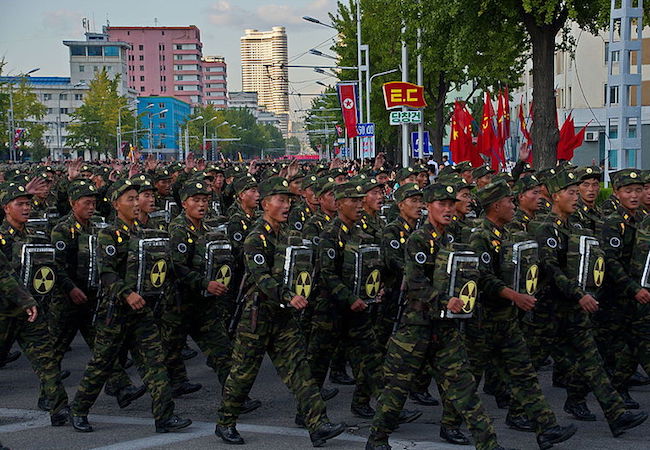
By Aaron Robles
Politics is a game of survival, where governments battle with guns and words to protect their citizens and procure more power.
To achieve its geopolitical ends, a government develops a set of policies and beliefs on how to compete with other countries, and continue its domain.
However, in the case of military confrontation, an ‘attribution error’ within the government’s belief system may occur. This happens when one country attributes its behavior to necessity, or survival, while believing that its rival is free to solve the dispute without consequence.
It is through this lens that North Korea sees its conflict with the United States.
North Korea’s motive to survive as a nation originates with a personal belief held by its first Premier- Kim Il Sung. During his decades long rule, Kim cultivated the political ideology of “juche”, or self-reliance, a philosophy that places commitment to the state above all else.
In 1955, Kim further defined the term, and Korea’s governing philosophy, by saying that “all ideological work must be subordinated to the interests of the Korean revolution.”
In other words, the Kim Regime demands that the state come before any individual desires, thus requiring unconditional loyalty from its citizens to ensure the country’s survival.
It should come as no surprise that the Kim family, seen as semi-divine figures in North Korea, have produced a leader like Kim Jong-un. Reared amidst the philosophy of juche, and within perhaps the most encompassing totalitarian state on earth, Jong-un is guided by the strict North Korean belief of isolated and state-centered political survival.
A major component of the country’s survival plan is the acquisition of a nuclear deterrent against foreign aggression. In pursuing a nuclear weapons program, North Korea seeks to emulate countries like China, who acquired considerable international leverage after successfully testing its first nuclear weapon in October 1964.
Within North Korea’s belief that nuclear weapons are essential to its existence, an ‘attribution error’ arises in the country’s relationship with the US.
According to the beliefs of the American government, North Korea has pursued nuclear weapons with a belligerent zeal, and not for self-preservation.
Because of these opposing viewpoints, steps must be taken by the US to resolve the ‘attribution error’ between the two countries. Indeed, because North Korea already possesses nuclear capability, diplomatic action by the American government is essential to prevent war and assure North Korea of its survival without nuclear arms.
The center of negotiations with the Kim regime should be the recent UN sanctions placed on North Korea’s economy. By using the sanctions as leverage, the US can negotiate with North Korea to stop its nuclear program and enact reforms that will offer them better political security than a nuclear arsenal.
First among those reforms is the opening of North Korea’s economy. Despite recent postings of economic growth, North Korea remains a closed market in need of liberalized reform. For example, the government owns almost all of the country’s land, suffers from pervasive corruption, fails to regularly collect taxes, and receives extensive food and energy subsidies from China.
In return for lifting the UN sanctions, Jong-un must agree to continue to open his economy to the world. Although the Kim regime has adopted some free-market principles, North Korea is still a poor state, with an economy barely 1/15 the size of neighboring South Korea. That said, reforms that strengthen the country’s economy will promote juche by including North Korea in the global market, and ensure its survival without relying on nuclear weapons.
Secondly, North Korea must allow international humanitarian aid to reach its poorest citizens. It is estimated that about 70 percent of the country’s people experience food insecurity, and around 7 million lack consistent access to drinking water.
By accepting humanitarian assistance for its ailing citizenry, the overall health of the country’s labor force would improve, offering consistent long-term economic stability conducive to political survival.
In all, the primary goal of the Kim regime is clear- carry out the ideology of juche to persist in a world that seeks to topple the country’s political order. That objective, however, creates an ‘attribution error’ between Pyongyang and Washington DC, and has led the countries to the brink of an armed conflict.
With that in mind, the US must see the current dispute as a conflict of ideologies, and adjust its policy to help North Korea achieve its goal by compelling economic reforms that liberalize the country’s markets and secure its position on the world stage.
Not only would this plan help avert a catastrophic war in the Korean peninsula, it creates a more stable North Korea and possibly a new trading partner in the Pacific Rim.
Aaron Robles is a teacher and graduate student living in Oakland, California. He holds a BA in Political Science from San Francisco State University, a law degree from Golden Gate University School of Law and is currently pursuing a Masters of Arts in Teaching at the University of Southern California. Aaron’ s professional experience includes legal clerkships in environmental and employment law, a congressional internship with a sitting United States Senator, and teaching at the primary and secondary grade levels.




